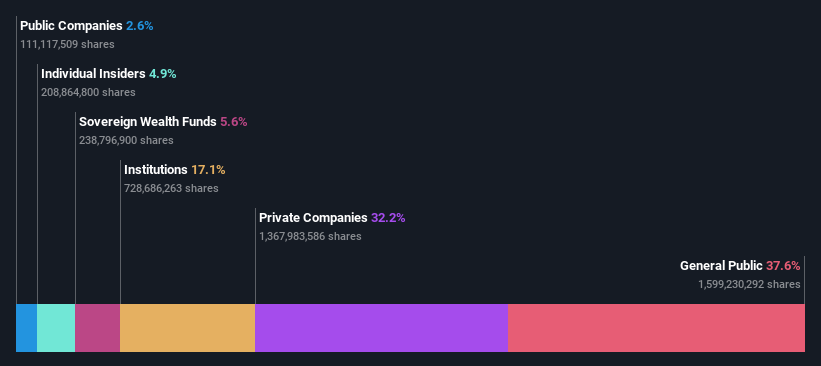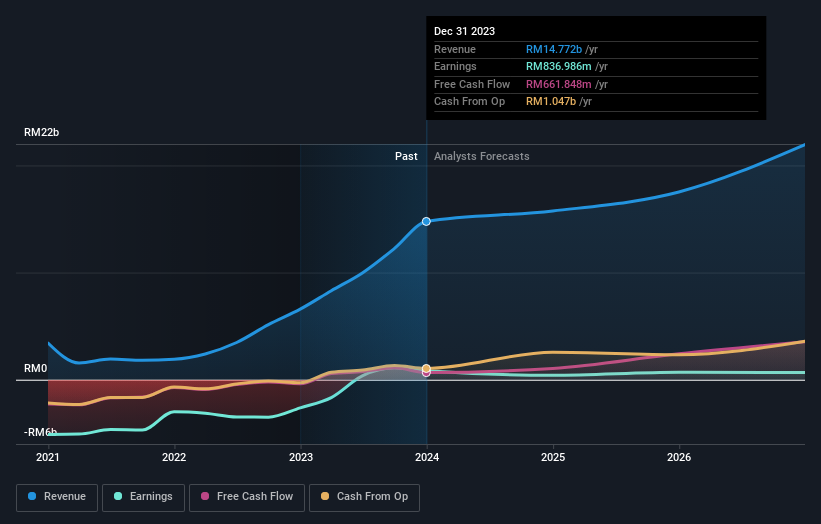Capital A Berhad's (KLSE:CAPITALA) top owners are retail investors with 38% stake, while 32% is held by private companies
Key Insights
Significant control over Capital A Berhad by retail investors implies that the general public has more power to influence management and governance-related decisions
The top 9 shareholders own 52% of the company
A look at the shareholders of Capital A Berhad (KLSE:CAPITALA) can tell us which group is most powerful. We can see that retail investors own the lion's share in the company with 38% ownership. That is, the group stands to benefit the most if the stock rises (or lose the most if there is a downturn).
And private companies on the other hand have a 32% ownership in the company.
Let's take a closer look to see what the different types of shareholders can tell us about Capital A Berhad.
View our latest analysis for Capital A Berhad
What Does The Institutional Ownership Tell Us About Capital A Berhad?
Institutions typically measure themselves against a benchmark when reporting to their own investors, so they often become more enthusiastic about a stock once it's included in a major index. We would expect most companies to have some institutions on the register, especially if they are growing.
Capital A Berhad already has institutions on the share registry. Indeed, they own a respectable stake in the company. This implies the analysts working for those institutions have looked at the stock and they like it. But just like anyone else, they could be wrong. It is not uncommon to see a big share price drop if two large institutional investors try to sell out of a stock at the same time. So it is worth checking the past earnings trajectory of Capital A Berhad, (below). Of course, keep in mind that there are other factors to consider, too.
Hedge funds don't have many shares in Capital A Berhad. Tune Group Sdn Bhd is currently the largest shareholder, with 12% of shares outstanding. For context, the second largest shareholder holds about 12% of the shares outstanding, followed by an ownership of 7.8% by the third-largest shareholder.
On further inspection, we found that more than half the company's shares are owned by the top 9 shareholders, suggesting that the interests of the larger shareholders are balanced out to an extent by the smaller ones.
While it makes sense to study institutional ownership data for a company, it also makes sense to study analyst sentiments to know which way the wind is blowing. There are plenty of analysts covering the stock, so it might be worth seeing what they are forecasting, too.
Insider Ownership Of Capital A Berhad
While the precise definition of an insider can be subjective, almost everyone considers board members to be insiders. The company management answer to the board and the latter should represent the interests of shareholders. Notably, sometimes top-level managers are on the board themselves.
I generally consider insider ownership to be a good thing. However, on some occasions it makes it more difficult for other shareholders to hold the board accountable for decisions.
Our most recent data indicates that insiders own some shares in Capital A Berhad. In their own names, insiders own RM148m worth of stock in the RM3.0b company. This shows at least some alignment. You can click here to see if those insiders have been buying or selling.
General Public Ownership
The general public-- including retail investors -- own 38% stake in the company, and hence can't easily be ignored. While this group can't necessarily call the shots, it can certainly have a real influence on how the company is run.
Private Company Ownership
We can see that Private Companies own 32%, of the shares on issue. Private companies may be related parties. Sometimes insiders have an interest in a public company through a holding in a private company, rather than in their own capacity as an individual. While it's hard to draw any broad stroke conclusions, it is worth noting as an area for further research.
Next Steps:
While it is well worth considering the different groups that own a company, there are other factors that are even more important. For example, we've discovered 5 warning signs for Capital A Berhad (3 can't be ignored!) that you should be aware of before investing here.
Ultimately the future is most important. You can access this free report on analyst forecasts for the company.
NB: Figures in this article are calculated using data from the last twelve months, which refer to the 12-month period ending on the last date of the month the financial statement is dated. This may not be consistent with full year annual report figures.
Have feedback on this article? Concerned about the content? Get in touch with us directly. Alternatively, email editorial-team (at) simplywallst.com.
This article by Simply Wall St is general in nature. We provide commentary based on historical data and analyst forecasts only using an unbiased methodology and our articles are not intended to be financial advice. It does not constitute a recommendation to buy or sell any stock, and does not take account of your objectives, or your financial situation. We aim to bring you long-term focused analysis driven by fundamental data. Note that our analysis may not factor in the latest price-sensitive company announcements or qualitative material. Simply Wall St has no position in any stocks mentioned.

 Yahoo Finance
Yahoo Finance 

